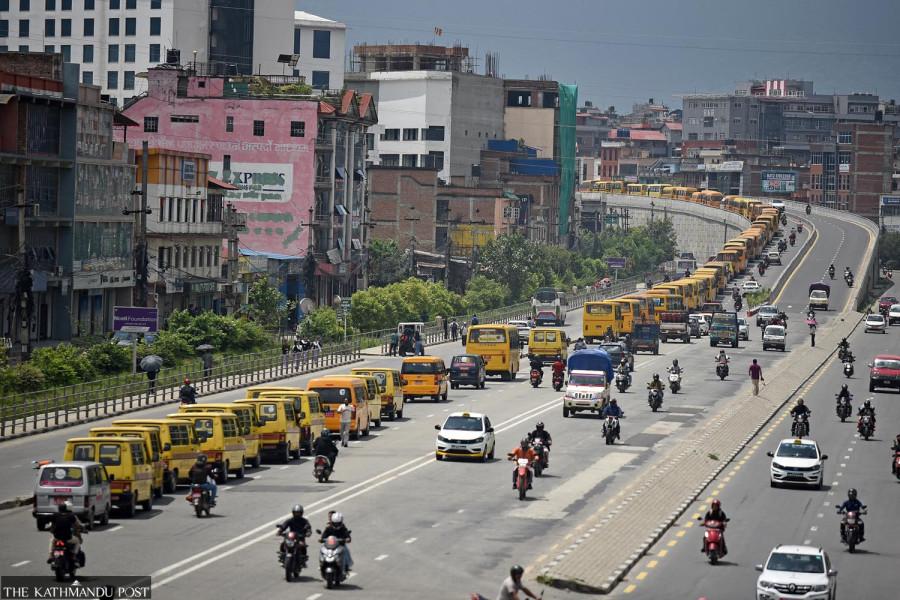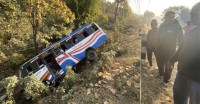National
Tussle grows over School Education Bill as student unions join the fray
17 student unions present demands countering the position of private school operators that have been agitating for weeks.
Post Report
As the House of Representatives prepares to endorse the School Education Bill next week, various groups are pressuring the government and parliamentarians to revise it, each demanding to include mutually contradictory provisions.
While private school associations are already hitting the streets, seventeen student associations, including those affiliated to the ruling parties, on Tuesday, submitted a memorandum to acting Prime Minister Prakash Man Singh to revise the bill in a way that stops commercialisation in the education sector. Their demands are contradictory to those from the private schools that are against the provisions barriers to their interest.
The student associations, along with the Nepali Congress-affiliated Nepal Students Union (NSU) and the All Nepal National Free Students Union (ANNFSU), student wing of the CPN-UML, have claimed the bill finalised by a House committee promotes privatisation of education and weakens the public education system.
“This will only push a new generation to foreign migration,” reads their memorandum that demands revision to the bill before endorsement.
They have said, in line with the spirit of the constitution, education up to the basic level should be made compulsory and free, and secondary education should be fully free of cost. They also demanded that all three tiers of government allocate at least 20 percent of their annual budgets to the education sector in order to improve the quality of community schools. Stopping registration of new private schools, bringing early childhood development (ECD), the pre-primary level, to the school system and establishment of Teachers' Academy to enhance teaching quality are the other demands of the student associations.
“Children of the individuals receiving state benefits must be enrolled in public schools. There must be uniformity in curriculum and language of instructions in the schools,” reads their memorandum. The seventeen associations are for recruiting all the teachers through open competition, which contradicts the positions of Nepal Teachers’ Federation. The federation is also in protest with different demands including increasing the quota for internal competition from 60 to 75 percent.
According to Dujang Sherpa, the NSU president, Singh said he was positive about addressing their demands. The student associations have warned of protests if the bill is endorsed without incorporating their demands.
The student unions said they will pressure the education departments of political parties on Thursday, hold signature and publicity campaigns for free education on September 5 and 7, submit memorandums to chief district officers nationwide on September 8 and hold nationwide student demonstrations, including in the Kathmandu Valley, on September 9.
Following months of deliberations, the Education, Health and Information Technology Committee of the House of Representatives on August 21 had endorsed the bill and forwarded it to the full house. The teachers and private school associations are already on the streets.
Contrary to the demands of student wings, the private school operators have been claiming that the bill restricts them in different ways. They have to remove the provisions that make it mandatory to provide three percent full scholarship and gradual transformation of the private schools into nonprofits.
The representatives of the Private and Boarding Schools’ Organisation Nepal, the National Private and Boarding Schools’ Association, Nepal, among others, have already forwarded their concern to President Ramchandra Paudel and Home Minister Ramesh Lekhak.
“We will be compelled to announce indefinite closure of schools if our demands remain unheard. We believe the bill gets endorsed accommodating our concerns," said RB Katwal, general secretary of PABSON.
Unlike other associations, the NPABSAN, however, has stood against shutting down the schools. “All the associations are in one place in our demands. However, we are not for school closures. We respect students’ right to education," said Pandav Hamal Thakur, chair of the NPABAN. “We believe the issues can be resolved through dialogues."




 22.11°C Kathmandu
22.11°C Kathmandu













